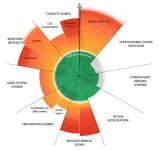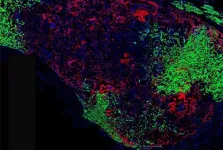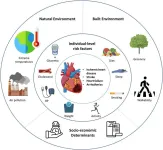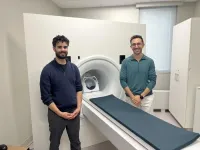(Press-News.org) A new study updates the planetary boundary framework and shows human activities are increasingly impacting the planet and, thereby, increasing the risk of triggering dramatic changes in overall Earth conditions.
For over 3 billion years, the interaction between life (represented by the planetary boundary, Biosphere Integrity) and climate have controlled the overall environmental conditions on Earth. Human activities, for example replacing nature with other land uses, changing the amount of water in rivers and in soil, the introduction of synthetic chemicals to the open environment, and the emission of greenhouse gases to the atmosphere all influence these interactions.
Respecting and maintaining interactions in the Earth system so that they remain similar to those that have controlled Earth conditions over the past ~12,000 years are critical for ensuring human activities do not trigger dramatic changes in Earth condition – changes that likely would decrease the Earth’s ability to support modern civilizations.
The nine “planetary boundaries” represent components of the global environment that regulate that stability and liveability of the planet for people. The degree of breaching of the safe boundary levels is caused by human-driven activities impacting the components. The planetary boundaries framework applies the newest scientific understanding of the functioning of the Earth system to identify a ”safe operating space” for humanity by proposing limits for the extent to which human activities can be allowed to impact critical processes without risk of potentially triggering irreversible changes in the Earth conditions that support us.
For the first time, metrics for all boundaries are presented. Six of the boundaries are found to be transgressed, and transgression is increasing for all boundaries except the degradation of the Earth’s ozone layer. A global focus on climate is not enough. Development of Earth system models that accurately reproduce interactions between boundaries, especially Climate and Biosphere Integrity, is an urgent priority.
The study, published in Science Advances, represents the third update of the framework carried out by twenty-nine scientists from eight different countries.
The Earth’s ”blood pressure” is too high
The trend of increasing transgression of the boundaries is worrying explains Katherine Richardson, professor at Globe Institute, Leader of the Sustainability Science Centre at the University of Copenhagen, and leader of the study:
- Crossing six boundaries in itself does not necessarily imply a disaster will ensue but it is a clear warning signal. We can regard it as we do our own blood pressure. A BP over 120/80 is not a guarantee of a heart attack but it increases the risk of one. Therefore, we try to bring it down. For our own – and our children’s – sakes we need to reduce the pressure on these six planetary boundaries.
An important conclusion of the study is that more focus is needed on interactions between the boundaries:
- Focus on human-caused climate change is not enough if we want to protect the earth system from irreversible harm, says Johan Rockström, Director of the Potsdam Institute for Climate Impact Research (PIK), and original proposer of the framework in 2009.
- Next to climate change, integrity of the biosphere is the second pillar of stability of our planet. Our research shows that mitigating global warming and saving a functional biosphere for the future have to go hand in hand”, co-author Wolfgang Lucht, Head of PIK’s department of Earth System Analysis, stresses.
Use of biomass affects biodiversity
The need to respect the Land Use Change boundary puts focus on the increasing global use of biomass as an alternative for coal, oil, and gas. Biomass is the product of photosynthesis, the process where plants convert the sun’s energy to energy that can be used by other living organisms and, thus, supplies the energy that supports biodiversity.
- Our study shows that humans are appropriating the equivalent of ~30 % of the energy that was available to support biodiversity before the Industrial Revolution, says Richardson.
- Surely, the removal of so much of the energy that otherwise would have been available to nature must be a driver of biodiversity loss. Therefore, we propose the adoption of Human Appropriation of Net Primary Production (HANPP), i.e., biomass use, as one of two metrics when assessing human impacts on biodiversity.
Better Earth system models needed
- A world that develops within science defined boundaries is the only way to navigate our current situation with rising, potentially catastrophic risks, at the planetary scale. We already recognise this on Climate, where the Paris agreement has adopted the climate planetary boundary of holding the 1.5°C limit. Similarly, the world has accepted the planetary boundary on biodiversity, when decided at the 2022 Montreal-Kunming COP15, to halt and reverse biodiversity loss on land and in the ocean, says Johan Rockström and continues:
- Our study shows, however, that this is by far not enough. The Planetary Boundaries science provides a ‘guide for action’ if we truly want to secure prosperity and equity for all on Earth, and this goes well beyond climate only, requiring novel Earth system modelling and analysis, and systematic efforts to protect, recover and rebuild planetary resilience.”
- Hopefully, adds Katherine Richardson, this new study will serve as a wake-up call for many and increase focus in the international community on the necessity of limiting our impacts on the planet in order to preserve and protect the Earth conditions that allow advanced human societies to flourish.
END
Six of nine planetary boundaries now exceeded
2023-09-13
ELSE PRESS RELEASES FROM THIS DATE:
University secures £2.66M to develop personalized cancer treatment
2023-09-13
University of Liverpool researchers have secured £2.66m Medical Research Council funding to clinically test a novel immunotherapeutic strategy for non-small cell lung cancer – one of the most deadly cancers.
Professor Christian Ottensmeier, and Professor Natalia Savelyeva from the Institute of Systems, Molecular and Integrative Biology are collaborating with industry partner Genomics England and working closely with Touchlight Genetics Ltd to develop a vaccine therapy for patients with non-small cell lung cancer who have not had sufficient benefit from standard immunotherapy.
Non-small ...
Natural compound found in plants inhibits deadly fungi
2023-09-13
A new study finds that a natural compound found in many plants inhibits the growth of drug-resistant Candida fungi — including its most virulent species, Candida auris, an emerging global health threat. The journal ACS Infectious Diseases published the discovery led by scientists at Emory University.
Laboratory-dish experiments showed that the natural compound, a water-soluble tannin known as PGG, blocks 90% of the growth in four different species of Candida fungi. The researchers also discovered how PGG inhibits the growth: It grabs up iron molecules, essentially starving the fungi of an essential nutrient.
By starving the fungi rather than attacking ...
Study reveals why cancer may spread to the spine
2023-09-13
The vertebral bones that form the spine are derived from a distinct type of stem cell that secretes a protein favoring tumor metastases, according to a study led by researchers at Weill Cornell Medicine. The discovery opens up a new line of research on spinal disorders, helps explain why solid tumors so often spread to the spine, and could lead to new orthopedic and cancer treatments.
In the study, published Sept. 13 in Nature, the researchers discovered that vertebral bone is derived from ...
Research empirically shows structural discrimination negatively impacts LGB youth and adults
2023-09-13
“This study provides evidence that supports the belief of researchers and advocates that national policies protecting the human rights of lesbian, gay and bisexual people have an impact on individual development,” University of Delaware Assistant Professor Eric K. Layland said. “For LGB people, many of these identity and social milestones occur during the critical developmental period of adolescence. Results of this study add to other research showing protective policy can benefit LGB health by ...
UTHealth Houston study: Unruptured brain aneurysms may be missed in routine clinical care, but AI-powered algorithm can help
2023-09-13
Unruptured cerebral aneurysms of sizes and locations that require attention may be frequently missed in routine clinical care, but a machine learning algorithm could minimize missed care opportunities, according to a new study from UTHealth Houston.
The research, published today in Stroke: Vascular and Interventional Neurology, was led by senior author Sunil A. Sheth, MD, associate professor in the Department of Neurology with McGovern Medical School at UTHealth Houston, as well as co-first authors Hyun Woo Kim, MD, vascular and interventional neurology fellow at UTHealth Houston, and ...
Electrifying vehicles in Chicago would save lives, reduce pollution inequities
2023-09-13
If the Chicago region replaced 30% of all on-road combustion-engine vehicles — including motorcycles, passenger cars and trucks, buses, refuse trucks and short- and long-haul trucks — with electric versions, it would annually save more than 1,000 lives and over $10 billion, according to a new Northwestern University study.
The new study, which simulates air quality at a neighborhood scale, also found that areas with predominantly Black, Hispanic and Latinx residents would benefit most.
The study underscores the potential of electric vehicles (EVs) to improve ...
Noted experts present detailed evidence on the impact of environmental issues on cardiovascular health
2023-09-13
Philadelphia, September 13, 2023 – There is already robust evidence that people living with cardiovascular disease are disproportionately affected by poor air quality and extreme temperatures, in large part due to climate change, the greatest threat to human health of the 21st century. In this special theme issue of the Canadian Journal of Cardiology, published by Elsevier, noted experts comprehensively review how climate change occurs and increases the risk of cardiovascular disease and provide practical tips on how to become a climate-smart cardiovascular healthcare provider.
Not long ago, climate change was a fringe topic deemed only ...
Western researchers use AI to predict recovery after serious brain injury
2023-09-13
Two graduate students from Western University have developed a ground-breaking method for predicting which intensive care unit (ICU) patients will survive a severe brain injury.
Matthew Kolisnyk and Karnig Kazazian combined functional magnetic resonance imaging (fMRI) with state-of-the art machine learning techniques to tackle one of the most complex issues in critical care.
Whether it is the result of a stroke, cardiac arrest or traumatic brain injury, lives can forever be changed by a serious brain injury. When patients are admitted to the ICU, families are faced with tremendous uncertainty. Will my loved one recover? Are they aware of what is going on? Will they ever be the same ...
Flu: Interferon-gamma from T follicular helper cells is required to create lung-resident memory B cells
2023-09-13
BIRMINGHAM, Ala. – During a bout of influenza, B cells interact with other immune cells and then take different paths to defend the body. One path is the B cells that differentiate into antibody producing cells. Another path is the B cells that differentiate into lung-resident memory B cells, or lung-BRMs, that are critical for pulmonary immunity.
Unlike antibody-producing B cells that help fight the current infection, the long-lived, non-circulating lung-BRMs migrate to the lungs from draining lymph nodes. ...
Three University of Oklahoma faculty receive National Institutes of Health funding to maximize their research
2023-09-13
For the first time in one year, three faculty at the University of Oklahoma have received Maximizing Investigators’ Research Awards from the National Institutes of Health.
The recipients are Gallogly College of Engineering faculty Vivek Bajpai, Ph.D., John R. Clegg, Ph.D., and Stefan Wilhelm, Ph.D. The highly competitive five-year, $1,866,485 grants will support their ambitious research programs without the need to recompete for funding throughout the duration of their awards.
Bajpai, an assistant professor in the School of Sustainable Chemical, Biological and Materials Engineering, will lead the project, “Epigenetic and Transcriptional ...








